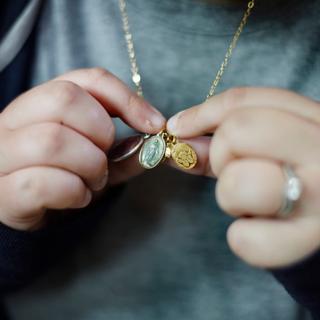


'There's more to life than buying a car; there's something deeper': Young practicing believers share their stories
Your storiesIn a materialistic society that views faith as archaic, they have embraced religion. For these young people of all denominations, the revisited practice involves new technologies and a more flexible approach to dogma.
"When I invited some friends to come and see me one afternoon at my parish for a YCW [Young Christian Workers] meeting, they thought we were all wearing albs. They couldn't believe we were playing Uno and eating pizza," recalled Anne-Sophie, 22, a hospital worker in Lisieux in northwest France, with a mischievous smile. Like the other young adults who agreed to share their experiences, this fan of the Bridgerton series often has to rectify misconceptions about her religious practice, which has little in common with that of past generations.
Believing in 2024 when you're under 30 is, first and foremost, a personal and thoughtful process. Anne-Sophie has been taking catechism classes for a year to prepare for her First Communion, which will take place next year. Benoît, 24, a member of a Catholic community in the Hauts-de-France region in the north, spoke about his learning process. "Getting to know God is a bit like making a new friend. It takes time to build the relationship. Around 15 to 16, I decided that God existed, but there was a whole journey through prayer, Christian summer camps, where I was able to nurture and improve this relationship. I was baptized and had my First Communion, because my family is very devout. But I waited until I was 21, when I was sure of myself, to have my confirmation, which is like renewing one's baptism."
The family environment still plays a major role in the transmission and choice of their faith, but nothing is set in stone: "I grew up Catholic with my paternal grandmother, who raised me and had me baptized. I went all the way to the profession of faith. As I grew up, I gradually turned to the Protestant Church, as I'm of Cameroonian origin on my mother's side, and my mother's sister is a pastor, just as my fiancé is Protestant," explained Solange, 28, a fashion entrepreneur and IT consultant based near Paris.
A disenchanted generation
Whatever their religion, for these young believers, the practice of their faith meets fairly similar expectations. First and foremost, it gives meaning to their lives. They described themselves as the generation most affected by Covid-19 and the questioning it prompted. They also cited environmental problems to explain this shared desire for hope. "To believe is to give meaning to a very materialistic society, and to affirm that life on earth is not just about buying a car. That there's something deeper. Believing also means saying 'it's going to be all right,' which, in my opinion, has never been as relevant as it is today, because you need a lot of hope when you read the IPCC [Intergovernmental Panel on Climate Change] reports," analyzed Hippolyte, 24, a student at the Ecole de Formation du Barreau de Paris and of Protestant faith.
You have 75.81% of this article left to read. The rest is for subscribers only.
